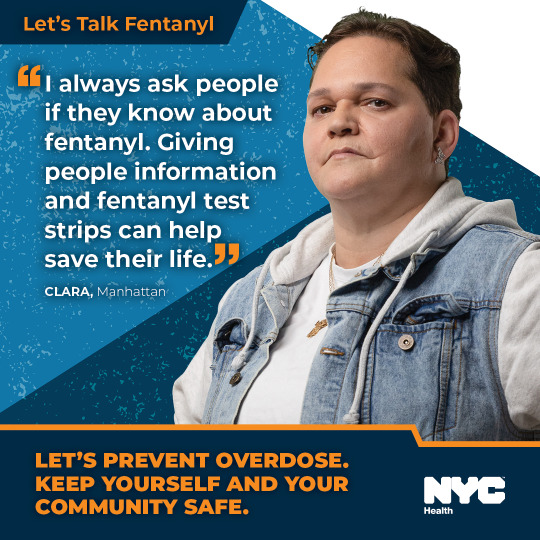#prevent overdose

Do you know aboutfentanyl? Fentanyl is a powerful opioid that has been found in heroin, cocaine, crack, methamphetamine, ketamine and pills from nonmedical sources. Anyone who uses drugs that may contain fentanyl, even occasionally, may be at risk of overdose.
The presence of fentanyl in the New York City drug supply has dramatically increased the number of overdose deaths, and fentanyl is now the most common drug involved in overdose deaths. In 2020, 1,580 New Yorkers died from a fentanyl-involved overdose.
To prevent an overdose:
Avoid using alone and take turns.
Start with a small dose and go slowly.
Keepnaloxone ready and on hand. Call 311 to find out where to get naloxone at no cost.
Avoid mixing drugs.
Test your drugs using fentanyl test strips

Fentanyl is stronger and faster-acting than other opioids. Using fentanyl or a substance that contains fentanyl increases the risk of overdose. The risk of overdose is even higher if fentanyl is present in a non-opioid drug (such as cocaine) and the person taking it does not usually use opioids.
Fentanyl overdoses require immediate medical attention. If you witness an overdose, call 911 and administer naloxone, a safe medication that can reverse an opioid overdose.
Signs of an opioid overdose include:
Unresponsiveness or loss of consciousness
Slow or stopped breathing
Blue, gray or white lips or fingernails
Snoring or gurgling sounds
Overdoses that involve fentanyl might also have additional symptoms, including:
Stiff, rigid or wooden-like jaw, chest or torso
Slow or irregular heartbeat
Seizure-like symptoms, such as jerking limbs and muscle spasms
To find naloxone near you, call 888-NYC-WELL or visit nyc.gov/naloxone.

TheCOVID-19 public health emergency has made many New Yorkers’ lives more stressful. Increased stress can change your drug and alcohol use routines, which may increase your risk of overdose.
Here are some ways to practice safer drug and alcohol use:
Practice Mindful Drinking
- Keep track of when and how much you drink
- Eat food and drink non-alcoholic beverages
- Avoid mixing drugs and alcohol
- Participate in activities that do not center around alcohol
Practice Safer Drug Use and Prevent Overdose
- Avoid using alone
- Start with less and use slowly
- Avoid mixing drugs
- Do not share drug use supplies, such as syringes or pipes
- Always have naloxone, also known as Narcan, nearby in case of an overdose
- Changes to the type of drugs you use and how much you use can affect your tolerance and increase the risk of overdose
- Be aware of fentanyl, a powerful opioid found in the drug supply that increases your risk of overdose
Learn more about how to reduce risk and prevent overdose.
